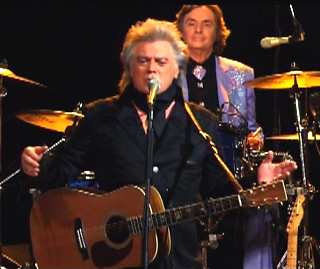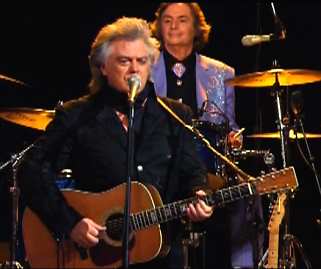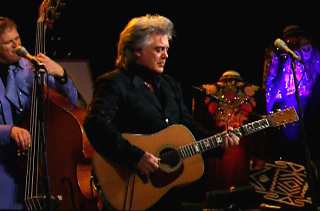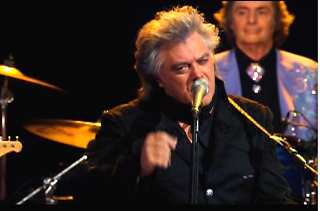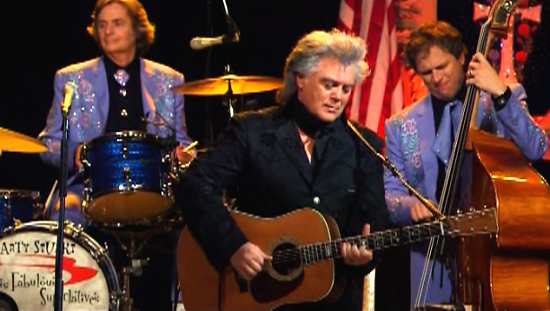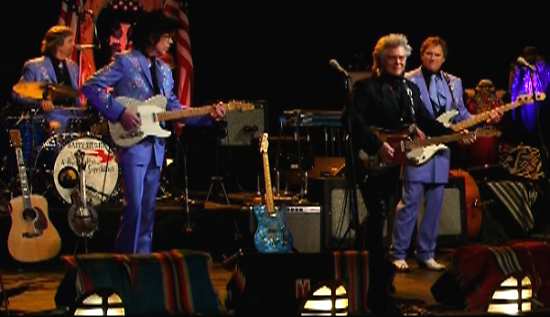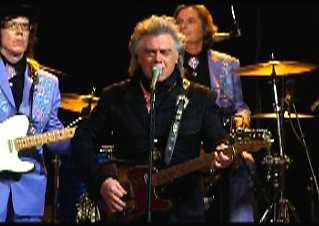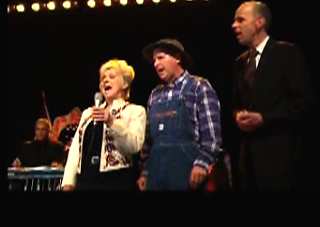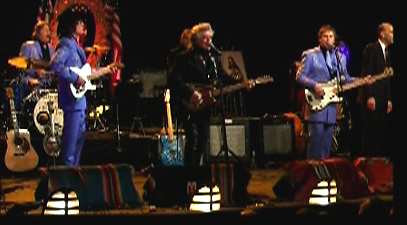|
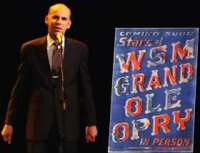 The final show of Season 5
of The Marty Stuart Show was a one-hour special taped
at the Ellis Theatre in Philadelphia, Mississippi the
end of June. Marty is Mississippi's number one
ambassador and he wanted to spotlight Neshoba County
and his hometown of Philadelphia, Mississippi,
something he's done on each show. Eddie Stubbs said,
"Stay tuned for RFD-TV's Philadelphia-Neshoba County
Arts Council's special presentation of The Marty
Stuart Show." The show opened with Marty walking down
the railroad tracks in Philadelphia as he spoke these
words: The final show of Season 5
of The Marty Stuart Show was a one-hour special taped
at the Ellis Theatre in Philadelphia, Mississippi the
end of June. Marty is Mississippi's number one
ambassador and he wanted to spotlight Neshoba County
and his hometown of Philadelphia, Mississippi,
something he's done on each show. Eddie Stubbs said,
"Stay tuned for RFD-TV's Philadelphia-Neshoba County
Arts Council's special presentation of The Marty
Stuart Show." The show opened with Marty walking down
the railroad tracks in Philadelphia as he spoke these
words:
I heard it whispering
through the pines, but I didn't know what it was,
I heard it in the church bells across town and it
touched down deep in my heart,
I heard it in the scream of a wildcat whistle
as the midnight train tore through the darkness behind
our house,
I felt it in the rhythm of a chain gang
as I watched them drive spikes into the rail bed in
the Pearl River swamp,
I saw it written on the faces of so many people
on the back roads around Philadelphia, Mississippi,
where I was raised,
It existed in the form of a ghostly presence and
surrounded me as if I were a
shadow that knew more about me than I knew of it,
I sensed music in all these things,
but it wasn't clear to me what kind of song the world
was singing,
Then like a bolt of lightning it hit me and I found it
was country music,
It captivated me and made me feel alive,
Even at an early age I somehow knew that my time on
earth
would be spent following this pillar of fire around
the world,
That's what I've done.
But sometimes the best thing to do is to go back home,
Ladies and gentlemen, welcome to Philadelphia,
Mississippi.
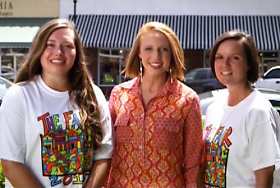 Eddie Stubbs opened the
show with, "From the historic Ellis Theatre in
downtown Philadelphia, Mississippi, it is time for The
Marty Stuart Show." Warm welcomes were received from
residents of Philadelphia. Eddie continued, "Appearing
on tonight's show, the Rolls Royce of country singers
Miss Connie Smith, the ole Tennessee Slicker Leroy
Troy, along with all The Fabulous Superlatives: Cousin
Kenny Vaughan, Handsome Harry Stinson, the Apostle
Paul Martin. plus Gary Carter on the steel guitar. I'm
Eddie Stubbs. Now direct from Route 8, Philadelphia,
Mississippi, how 'bout a Superlative welcome for our
host. Here is Marty Stuart." Marty and His Fabulous
Superlatives opened the show with "Mississippi Woman." Eddie Stubbs opened the
show with, "From the historic Ellis Theatre in
downtown Philadelphia, Mississippi, it is time for The
Marty Stuart Show." Warm welcomes were received from
residents of Philadelphia. Eddie continued, "Appearing
on tonight's show, the Rolls Royce of country singers
Miss Connie Smith, the ole Tennessee Slicker Leroy
Troy, along with all The Fabulous Superlatives: Cousin
Kenny Vaughan, Handsome Harry Stinson, the Apostle
Paul Martin. plus Gary Carter on the steel guitar. I'm
Eddie Stubbs. Now direct from Route 8, Philadelphia,
Mississippi, how 'bout a Superlative welcome for our
host. Here is Marty Stuart." Marty and His Fabulous
Superlatives opened the show with "Mississippi Woman."
Marty said, "Good to be home in
Philadelphia, Mississippi, ladies and gentlemen."
Marty takes a trip to WHOC-AM and visits with DJ Joe
Vines who put Marty on the air. Joe talked about
Marty's ambassadorship for the state of Mississippi.
Marty said he was at his aunt's house when he first
heard Johnny Cash's "Live at Folsom Prison" in 1968.
Joe was on the air at the time. Marty was so
impressed, he called Joe and Joe played the song again
for him. Marty said, "I could not move from in front
of those speakers. It mesmerized me." Marty also
talked about hearing Joe make the announcement that
Connie Smith was going to play the Choctaw Indian Fair
in July 1970. Marty said, "I went tearin' through the
house to tell mama. Joe Vines said Connie Smith is
comin' to town." Joe asked if Connie was going to be
at the show at the Ellis Theatre and Marty promised
him she would be there.
Marty introduced Connie Smith who
sang "Where Is My Castle."
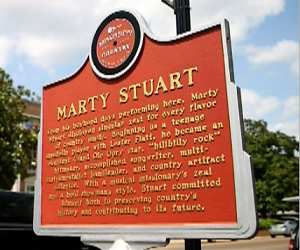 After a commercial break,
more wonderful Philadelphia residents gave their
welcomes. Marty and The Fabulous Superlatives took
their bus and instruments to Philadelphia Gun and Pawn
Shop. There they talked with Jackie Conn, owner. and
Larry Freeny. Marty holds up his mandolin and says,
"Loaded with history. loaded with history. We hit a
little snag on the edge of town at the casino. You
know." Jackie said, "It can happen. It can happen."
Handsome Harry said, "Well it did." Marty laughed.
Jackie said, "Well, that's what we're here for." Marty
said, "Mandolin, bass fiddle, drum, and Martin guitar
from a world-class hillbilly band. What can you do?"
Jackie said, "Well, first I need to see what they'll
do." Marty said, "All right." Jackie said, "Give 'em a
test drive." Marty said, "Will it help?" Jackie said,
"It will help." Marty continued, "Well, all right. How
'bout 'The Mississippi Railroad Blues'." Jackie said,
"Sounds good." During the song, Marty told Kenny,
"Make it sound more expensive." After a commercial break,
more wonderful Philadelphia residents gave their
welcomes. Marty and The Fabulous Superlatives took
their bus and instruments to Philadelphia Gun and Pawn
Shop. There they talked with Jackie Conn, owner. and
Larry Freeny. Marty holds up his mandolin and says,
"Loaded with history. loaded with history. We hit a
little snag on the edge of town at the casino. You
know." Jackie said, "It can happen. It can happen."
Handsome Harry said, "Well it did." Marty laughed.
Jackie said, "Well, that's what we're here for." Marty
said, "Mandolin, bass fiddle, drum, and Martin guitar
from a world-class hillbilly band. What can you do?"
Jackie said, "Well, first I need to see what they'll
do." Marty said, "All right." Jackie said, "Give 'em a
test drive." Marty said, "Will it help?" Jackie said,
"It will help." Marty continued, "Well, all right. How
'bout 'The Mississippi Railroad Blues'." Jackie said,
"Sounds good." During the song, Marty told Kenny,
"Make it sound more expensive."
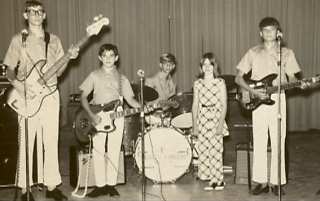 After the song, Jackie
said, "See, just name your price." Marty then talked
about "Philadelphia always being a country music
friendly town. The Neshoba County Fair has always had
country music entertainment and still does. The
Choctaw Indian Fair has always booked country music
stars. One particular show that came through this town
that changed my life was in July of 1970. The Connie
Smith Show." Marty and Connie joined Chief Phyliss
Anderson at the football field at Choctaw Central
where the concert in 1970 was held. Marty and Connie
walked to the spot where the stage was. Marty said,
"Well, baby, I probably remember this a lot better
than you do. The details of the night. But your stage
was right here." Connie said, "I remember that." Marty
said, "We were sittin' right over there. Me and my mom
and my sister. And you sang your songs. And what I
didn't know that night was Les Leverett was here. The
great photographer from Nashville. After it was over
with, me and my sister Jennifer got our picture made
with ya right there. You remember comin' here playin?"
Connie said, "I do. The thing I remember about meetin'
you is Weldon Myrick was on the show, Jerry Shook and
Johnny Gimble. Several people were playin'." Marty
said, "Nashville session musicians." Connie said,
"Nashville session musicians. And the part I remember
is this little gorgeous little kid hopped up the
stage. Was over there talkin' to Weldon. I don't know
if you remember but you were askin' him what gauge
strings he used and all kinds of questions. And I
thought, here's this kid he has not a bashful bone in
his body and yet he's talkin' to Weldon like a
grownup. And I was impressed." Marty said, "I was
workin' my way to you through the pickers." Connie
laughed and said, "That's one of the main things I
remember." Marty said, "After it was over, I wanted
one more look atcha. So we were leavin' that gate and
I asked my mama, 'mama, let me borrow your camera'.
And you were sittin' in your station wagon right
there." Connie said, "That's right." Marty continued,
"And I went and said, 'Miss Smith, can I take your
picture' and you were just sittin' there and I took
your picture. And that's the first picture I ever made
in my life." Connie said, "I'm honored." Marty said,
"Yeah. That'll teach ya to come to Philadelphia,
Mississippi." Connie said, "That's right." Marty
continued, "But on the way home that night, I said,
'mama, I'm gonna marry her some day'. Thank you very
much for marryin' me. Here's what I wanted to do that
night." After the song, Jackie
said, "See, just name your price." Marty then talked
about "Philadelphia always being a country music
friendly town. The Neshoba County Fair has always had
country music entertainment and still does. The
Choctaw Indian Fair has always booked country music
stars. One particular show that came through this town
that changed my life was in July of 1970. The Connie
Smith Show." Marty and Connie joined Chief Phyliss
Anderson at the football field at Choctaw Central
where the concert in 1970 was held. Marty and Connie
walked to the spot where the stage was. Marty said,
"Well, baby, I probably remember this a lot better
than you do. The details of the night. But your stage
was right here." Connie said, "I remember that." Marty
said, "We were sittin' right over there. Me and my mom
and my sister. And you sang your songs. And what I
didn't know that night was Les Leverett was here. The
great photographer from Nashville. After it was over
with, me and my sister Jennifer got our picture made
with ya right there. You remember comin' here playin?"
Connie said, "I do. The thing I remember about meetin'
you is Weldon Myrick was on the show, Jerry Shook and
Johnny Gimble. Several people were playin'." Marty
said, "Nashville session musicians." Connie said,
"Nashville session musicians. And the part I remember
is this little gorgeous little kid hopped up the
stage. Was over there talkin' to Weldon. I don't know
if you remember but you were askin' him what gauge
strings he used and all kinds of questions. And I
thought, here's this kid he has not a bashful bone in
his body and yet he's talkin' to Weldon like a
grownup. And I was impressed." Marty said, "I was
workin' my way to you through the pickers." Connie
laughed and said, "That's one of the main things I
remember." Marty said, "After it was over, I wanted
one more look atcha. So we were leavin' that gate and
I asked my mama, 'mama, let me borrow your camera'.
And you were sittin' in your station wagon right
there." Connie said, "That's right." Marty continued,
"And I went and said, 'Miss Smith, can I take your
picture' and you were just sittin' there and I took
your picture. And that's the first picture I ever made
in my life." Connie said, "I'm honored." Marty said,
"Yeah. That'll teach ya to come to Philadelphia,
Mississippi." Connie said, "That's right." Marty
continued, "But on the way home that night, I said,
'mama, I'm gonna marry her some day'. Thank you very
much for marryin' me. Here's what I wanted to do that
night."
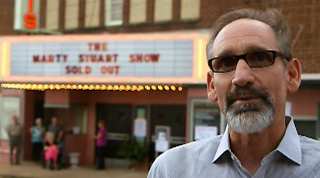 Malcolm White, director of
tourism for the Mississippi Development Authority
talked about catching Marty's rehearsal of "I Met My
Baby At The Choctaw Fair." He said, "It pretty much
sums it up for us. He's got a Bo Diddley beat going,
with this amazing band. He's got Choctaw dancers on
stage,and he's talkin' about Connie Smith. And it sums
up his global approach and the way that he loves the
place that he came from, and the way that he takes
that with him everywhere he goes. He carries that very
positive message that many people don't know about
Mississippi. Look, it's easy for us to acknowledge
that often times people think negative things about
us. But when Marty Stuart speaks for us, he takes away
all the negatives, inserts the positives, and puts it
to a Bo Diddley beat, and everybody has a great time." Malcolm White, director of
tourism for the Mississippi Development Authority
talked about catching Marty's rehearsal of "I Met My
Baby At The Choctaw Fair." He said, "It pretty much
sums it up for us. He's got a Bo Diddley beat going,
with this amazing band. He's got Choctaw dancers on
stage,and he's talkin' about Connie Smith. And it sums
up his global approach and the way that he loves the
place that he came from, and the way that he takes
that with him everywhere he goes. He carries that very
positive message that many people don't know about
Mississippi. Look, it's easy for us to acknowledge
that often times people think negative things about
us. But when Marty Stuart speaks for us, he takes away
all the negatives, inserts the positives, and puts it
to a Bo Diddley beat, and everybody has a great time."
Marty said, "Here is a song I wrote
about the night I met and saw Connie Smith at the
Choctaw Fair."
After a commercial break, there were
more warm welcomes from the residents of Philadelphia.
Marty, Connie, The Fabulous Superlatives, Gary Carter,
Leroy Troy and Eddie Stubbs hopped on the bus and went
to see Sid Williams at Williams Brothers Grocery.
Marty rattled off some things the store carries and
then said, "But the main thing we need. We've looked
all over the United States of America for Cousin Kenny
a belt to hold his britches up. Have ya got belts?"
Sid says, "Oh we've got plenty of belts." Kenny said,
"I want one like that right there," pointing to Sid's
belt. Marty said, "Like Sid's wearin'?" Kenny said,
"That one looks good." Sid said, "You like this belt
here?" Kenny said, "I believe you've outgrown that
one." Marty said, "Would you sell that to Cous?" Sid
said, "Hmm, Cous, I hate to tell ya no, but an old
Indian chief gave me this belt and money couldn't buy
this belt." Marty said, "Oh come on, Sid. How come you
ain't ever sold in your life?" Sid said, "Well, I'm
sorry but this belt, I gotta keep this belt." Marty
said, "Well, all right. We're gonna go shoppin' and
you and Cous can go work on it."
Marty said, "Make welcome Cousin
Kenny everybody. Cous, welcome to Philadelphia,
Mississippi." Kenny said, "It's nice to be here."
Marty continued, "Have you enjoyed yourself around
here?" Kenny said, "I have had a wonderful time."
Marty said, "All right. Show 'em what ya got today."
Kenny unbuttoned his jacket and said, "I got it off
Sid Williams out at Willliamsville. Got a new belt."
Marty and His Fabulous Superlatives performed
"Torpedo."
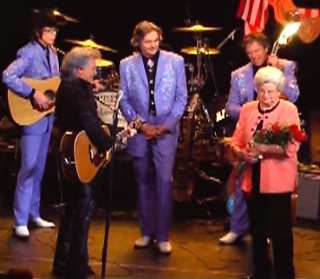 Marty said, "I've often
said that it's the people that define a town. And some
of the finest people I know of in Philadelphia,
Mississippi and I mean that from the bottom of my
heart. It's precious people here. One lady in
particular comes to mind. Just right across the
street, down the street, I guess, from the Ellis
Theatre here, there's a place called 'Peggy's'. We all
know and love Peggy Webb. She's a Philadelphia legend.
She's a Mississippi institution. What a lot of people
don't know about Peggy is that she and her husband Don
started their restaurant in 1961. That's how she fed
her family. But everybody knows about her service in
this community. It was community tables. She put it on
the honor system. We all pay at the basket. Make our
own change. That's what Peggy thought of human beings.
She trusted us. But it was the people that couldn't
eat, couldn't afford to eat. That's the ones Peggy fed
too. And after work, leftovers were left on the table
for the kids to come by. Ladies and gentlemen, we'd
like for you to meet our loved Peggy Webb. Whataya
think." Peggy walked out on stage to a standing
ovation. Marty gave her a big hug and handed her a
bouquet of red roses. Marty said, "Peggy, on behalf of
everybody in this place, we love you with all of our
hearts." Peggy said, "I love you back." Marty said,
"We're gonna sing you a song or two. If you can just
stand there for a second, I'll talk to you in a
minute." Marty and His Fabulous Superlatives sang "All
For The Love Of A Girl." Marty said, "I've often
said that it's the people that define a town. And some
of the finest people I know of in Philadelphia,
Mississippi and I mean that from the bottom of my
heart. It's precious people here. One lady in
particular comes to mind. Just right across the
street, down the street, I guess, from the Ellis
Theatre here, there's a place called 'Peggy's'. We all
know and love Peggy Webb. She's a Philadelphia legend.
She's a Mississippi institution. What a lot of people
don't know about Peggy is that she and her husband Don
started their restaurant in 1961. That's how she fed
her family. But everybody knows about her service in
this community. It was community tables. She put it on
the honor system. We all pay at the basket. Make our
own change. That's what Peggy thought of human beings.
She trusted us. But it was the people that couldn't
eat, couldn't afford to eat. That's the ones Peggy fed
too. And after work, leftovers were left on the table
for the kids to come by. Ladies and gentlemen, we'd
like for you to meet our loved Peggy Webb. Whataya
think." Peggy walked out on stage to a standing
ovation. Marty gave her a big hug and handed her a
bouquet of red roses. Marty said, "Peggy, on behalf of
everybody in this place, we love you with all of our
hearts." Peggy said, "I love you back." Marty said,
"We're gonna sing you a song or two. If you can just
stand there for a second, I'll talk to you in a
minute." Marty and His Fabulous Superlatives sang "All
For The Love Of A Girl."
Marty said, "And now a word from
the lady of the hour. How 'bout a hand for Peggy
Webb." Peggy said, "Words can't say what Philadelphia
and Neshoba's meant to me and my family through the
years, especially in the early years that all I had
goin' for me was I knew how to cook. Through the grace
of God and you people, I've made it. And I love all of
you. And to Marty and Connie and the band, I couldn't
have a better .. not many people have a 80th birthday
party like I've had this week. And I thank you all."
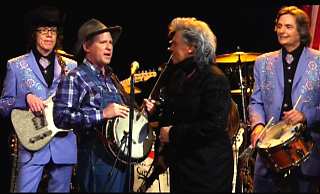 Marty said, "Thank you. I
love you. I love you. If you'll have a seat over
there, I've got a fabulous artist for you. Ladies and
gentlemen, the ole Tennessee Slicker, the most popular
man in country music, the Sultan of Goodlettsville.
How 'bout a hand for Leroy Troy. Hello Leroy. Welcome
to Philadelphia." Leroy said, "Hey. I am so glad to be
here. I've had the biggest times since I've been
here." Marty said, "Have you?" Leroy said, "I got to
see the whole town. I got to see Miss Peggy's place."
Marty said, "Well you know by now that Wednesday is
Chicken Day at Peggy's don'tcha?" Leroy said, "Is it
Wednesday or is it Tuesday and Friday?" Marty turned
to Peggy and said, "What is it?" Peggy said, "Tuesday,
Wednesday and Friday." Marty said, "Oh, I stand
corrected." Leroy said, "We were both right." Marty
said, "That's right. Well, do you have anything that
would speak to the occasion?" Leroy said, "Shoot yeah.
I'm gonna dedicate this one to Miss Peggy." Marty
said, "All right." Leroy said, "And also, to all them
chickens that have passed over her dinner tables."
Leroy sang "Ghost Chickens In The Sky." Marty said, "Thank you. I
love you. I love you. If you'll have a seat over
there, I've got a fabulous artist for you. Ladies and
gentlemen, the ole Tennessee Slicker, the most popular
man in country music, the Sultan of Goodlettsville.
How 'bout a hand for Leroy Troy. Hello Leroy. Welcome
to Philadelphia." Leroy said, "Hey. I am so glad to be
here. I've had the biggest times since I've been
here." Marty said, "Have you?" Leroy said, "I got to
see the whole town. I got to see Miss Peggy's place."
Marty said, "Well you know by now that Wednesday is
Chicken Day at Peggy's don'tcha?" Leroy said, "Is it
Wednesday or is it Tuesday and Friday?" Marty turned
to Peggy and said, "What is it?" Peggy said, "Tuesday,
Wednesday and Friday." Marty said, "Oh, I stand
corrected." Leroy said, "We were both right." Marty
said, "That's right. Well, do you have anything that
would speak to the occasion?" Leroy said, "Shoot yeah.
I'm gonna dedicate this one to Miss Peggy." Marty
said, "All right." Leroy said, "And also, to all them
chickens that have passed over her dinner tables."
Leroy sang "Ghost Chickens In The Sky."
After a commercial break, Betty Lou
Jones, President of the Jimmie Rodgers Foundation was
on stage to present Marty with a plaque. She said,
"Marty Stuart has been a great supporter of the Jimmie
Rodgers Museum and Foundation. And he is a great fan
of Jimmie Rodgers. Tonight we are officially giving
him his artist copy of the bronze plaque that is
placed in the museum in his honor as he joins Ernest
Tubb, Hank Snow, Merle Haggard, Gene Autry, and Tanya
Tucker in the Blue Yodelers Hall of Fame." Marty said,
"All right. I'll take it. Thank you, Betty Lou. Thank
you very much." Betty Lou said, "I would like to share
with you the wording on this: 'Marty Stuart, like
Jimmie Rodgers, came from simple Mississippi roots and
has honored the place and the man while taking
America's music to the world. As a star of the Grand
Ole Opry, musician, songwriter, TV host, and presenter
of country music, and preserver of country music
history, Marty Stuart has followed the Blue Yodeler
model as a showman and spokesman from the common
people's perspective.' Congratulations, Marty." Marty
said, "Thank you very much. I love you."
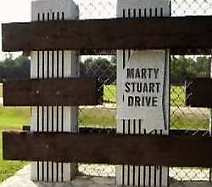 We received more warm
welcomes from the residents of Philadelphia. Paul
Martin talked about Marty and how much the city of
Philadelphia loves Marty. Harry Stinson talked about
the genres of music and artists and other famous
people from Mississippi. Kenny Vaughan talked about
his musical heroes who are from Mississippi whom he
didn't know were from the Magnolia state. Connie said,
"When you come to Mississippi, you fall in love with
the people and then you fall in love with the culture
and the music that's there." They all talked about
Marty's influence on them. We received more warm
welcomes from the residents of Philadelphia. Paul
Martin talked about Marty and how much the city of
Philadelphia loves Marty. Harry Stinson talked about
the genres of music and artists and other famous
people from Mississippi. Kenny Vaughan talked about
his musical heroes who are from Mississippi whom he
didn't know were from the Magnolia state. Connie said,
"When you come to Mississippi, you fall in love with
the people and then you fall in love with the culture
and the music that's there." They all talked about
Marty's influence on them.
Steven Stubbs, curator, welcomed us
to the Philadelphia-Neshoba County Historical Museum
and the Marty Stuart Room inside the museum. He said
one of his favorite artifacts are Marty's eighth grade
report cards from Philadelphia High School, showing he
was quite prolific in band, but not so much in math.
Marguarita Stuart, also curator, said one of the music
artifacts is Marty's first electric guitar. Her
favorite item in the room is the Indian blanket given
to Connie on that night in July 1970 by Chief York.
Marty said, "How 'bout a fiddle tune
right now from my man Eddie Stubbs. How 'bout a hand
for Eddie Stubbs and his flyin' fiddle." Eddie Stubbs
performed "Wake Up Susan."
Eddie said, "One of the special
times of the Marty Stuart Show on each and every
episode when we declare hymn time. And we hope that
come next Sunday that you and yours will make the time
to attend the church of your choice. To get us
inspired a little bit ahead of time, we're gonna call
on Connie Smith right now and she's gonna sing one of
her very favorite songs that she's recorded through
the years. 'When I Need Jesus'."
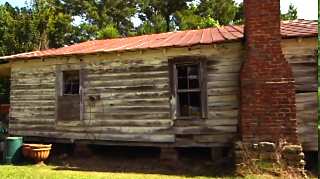 After a commercial break,
Marty and Leroy were in Marty's Cadillac driving past
Marty's parents first house up to Marty's grandparents
homestead where friends and relatives were gathered to
welcome them. Marty said, "This house behind me
belonged to my grandpa Levi Lincoln Stuart and my
grandma Eddie Lee Stuart. They raised their sons and
daughters here. My daddy was born here on this place.
And it's the family homeplace. And my grandpa was a
wonderful character. And he was an old-time
Mississippi fiddle player. One of my original pickin'
buddies. Loved playin' music with him. But this porch
back here represents so much to me because when I was
a little boy, havin' my big dreams about singin' and
playin' music, I'd stand on this front porch with my
guitar and play to the birds and the pine trees and
the clouds. And that porch could be the Grand Ole Opry
or Carnegie Hall or Folsom Prison, wherever I wanted
it to be. It was a wonderful place. And my dreams came
to me somewhere between this old porch right here and
that railroad track that ran behind our house. What a
great place." Leroy and Marty then amused the crowd by
performing "The Death of John Henry." After a commercial break,
Marty and Leroy were in Marty's Cadillac driving past
Marty's parents first house up to Marty's grandparents
homestead where friends and relatives were gathered to
welcome them. Marty said, "This house behind me
belonged to my grandpa Levi Lincoln Stuart and my
grandma Eddie Lee Stuart. They raised their sons and
daughters here. My daddy was born here on this place.
And it's the family homeplace. And my grandpa was a
wonderful character. And he was an old-time
Mississippi fiddle player. One of my original pickin'
buddies. Loved playin' music with him. But this porch
back here represents so much to me because when I was
a little boy, havin' my big dreams about singin' and
playin' music, I'd stand on this front porch with my
guitar and play to the birds and the pine trees and
the clouds. And that porch could be the Grand Ole Opry
or Carnegie Hall or Folsom Prison, wherever I wanted
it to be. It was a wonderful place. And my dreams came
to me somewhere between this old porch right here and
that railroad track that ran behind our house. What a
great place." Leroy and Marty then amused the crowd by
performing "The Death of John Henry."
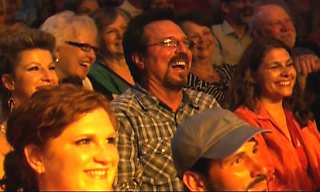 Marty introduced his
lifetime best friend Butch Hodgins. Marty said, "Butch
and I were raised two doors apart on Kosciusko Road
and behind our houses ran the train track. The Gulf,
Mobile and Ohio Railroad, right Butch? And they used
to stop the train on this side of the tracks and take
the front half of the train to U.S. Motors where my
daddy worked and pick up a load of steel, come hook
back up and take off and go to north Mississippi with
it. And there was a fella when they'd stop the train
... me and Butch would go down and visit with that
worked in the caboose and he gave us stationery,
pencils, flares. I still don't know who set them woods
on fire, do you? One day Butch was off doin' somethin'
and the train was stopped and I went down there and
there was this fella standin' there smokin' a
cigarette by the stopped train. And his hair was kinda
crazy. And he was wearin' a scarf. And he was wearin'
clothes that looked like they were from another time.
Kinda ruined finery. And he told me great stories
about travelin' to beautiful, far away, exotic lands
-- like Alabama and Arkansas. He fascinated me. He
captivated me with his stories. And when the train
started to take off, he thumped his cigarette and he
jumped up on her and I said, 'Scuse me sir. Can you
tell me what you are?'. He said, 'Boy, I'm a hobo.'
And I had a revelation. I said 'That's what I'm gonna
do with my life'. And I went home and I said, 'Mama, I
found it. I know what I'm gonna do.' So ladies and
gentlemen, I say to you, here I stand, with a scarf,
clothes from another time, I've been to Alabama and
Arkansas. I am the personification of the American
dream. I am a hobo. Thank you very much. From the
record The Pilgrim, here's a song I
wrote called 'Hobo's Prayer'." Marty introduced his
lifetime best friend Butch Hodgins. Marty said, "Butch
and I were raised two doors apart on Kosciusko Road
and behind our houses ran the train track. The Gulf,
Mobile and Ohio Railroad, right Butch? And they used
to stop the train on this side of the tracks and take
the front half of the train to U.S. Motors where my
daddy worked and pick up a load of steel, come hook
back up and take off and go to north Mississippi with
it. And there was a fella when they'd stop the train
... me and Butch would go down and visit with that
worked in the caboose and he gave us stationery,
pencils, flares. I still don't know who set them woods
on fire, do you? One day Butch was off doin' somethin'
and the train was stopped and I went down there and
there was this fella standin' there smokin' a
cigarette by the stopped train. And his hair was kinda
crazy. And he was wearin' a scarf. And he was wearin'
clothes that looked like they were from another time.
Kinda ruined finery. And he told me great stories
about travelin' to beautiful, far away, exotic lands
-- like Alabama and Arkansas. He fascinated me. He
captivated me with his stories. And when the train
started to take off, he thumped his cigarette and he
jumped up on her and I said, 'Scuse me sir. Can you
tell me what you are?'. He said, 'Boy, I'm a hobo.'
And I had a revelation. I said 'That's what I'm gonna
do with my life'. And I went home and I said, 'Mama, I
found it. I know what I'm gonna do.' So ladies and
gentlemen, I say to you, here I stand, with a scarf,
clothes from another time, I've been to Alabama and
Arkansas. I am the personification of the American
dream. I am a hobo. Thank you very much. From the
record The Pilgrim, here's a song I
wrote called 'Hobo's Prayer'."
Marty said, 'How 'bout a hand for
Miss Connie Smith, everybody. How 'bout a hand for
Leroy Troy. How 'bout a hand for Eddie Stubbs. How
'bout a hand for Gary Carter. Come up here, Gary. Send
this out to everybody in Stallo, Mississippi." They
closed the show with "Pretty Katy Kline."
|
 The final show of Season 5
of The Marty Stuart Show was a one-hour special taped
at the Ellis Theatre in Philadelphia, Mississippi the
end of June. Marty is Mississippi's number one
ambassador and he wanted to spotlight Neshoba County
and his hometown of Philadelphia, Mississippi,
something he's done on each show. Eddie Stubbs said,
"Stay tuned for RFD-TV's Philadelphia-Neshoba County
Arts Council's special presentation of The Marty
Stuart Show." The show opened with Marty walking down
the railroad tracks in Philadelphia as he spoke these
words:
The final show of Season 5
of The Marty Stuart Show was a one-hour special taped
at the Ellis Theatre in Philadelphia, Mississippi the
end of June. Marty is Mississippi's number one
ambassador and he wanted to spotlight Neshoba County
and his hometown of Philadelphia, Mississippi,
something he's done on each show. Eddie Stubbs said,
"Stay tuned for RFD-TV's Philadelphia-Neshoba County
Arts Council's special presentation of The Marty
Stuart Show." The show opened with Marty walking down
the railroad tracks in Philadelphia as he spoke these
words: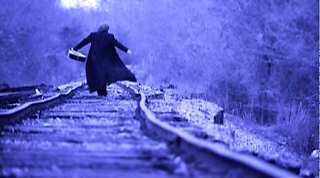
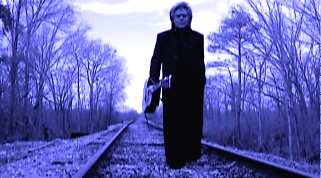
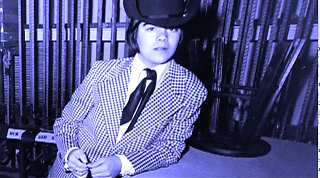
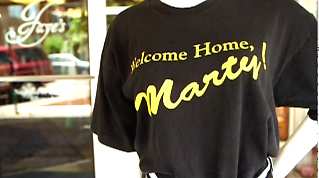
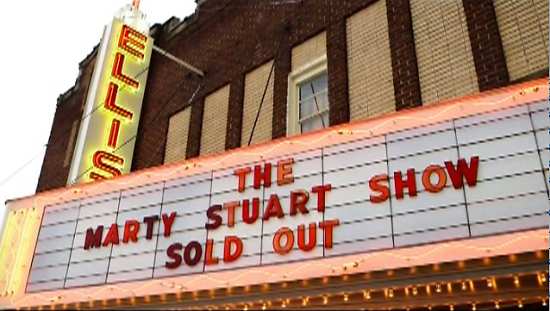
 Eddie Stubbs opened the
show with, "From the historic Ellis Theatre in
downtown Philadelphia, Mississippi, it is time for The
Marty Stuart Show." Warm welcomes were received from
residents of Philadelphia. Eddie continued, "Appearing
on tonight's show, the Rolls Royce of country singers
Miss Connie Smith, the ole Tennessee Slicker Leroy
Troy, along with all The Fabulous Superlatives: Cousin
Kenny Vaughan, Handsome Harry Stinson, the Apostle
Paul Martin. plus Gary Carter on the steel guitar. I'm
Eddie Stubbs. Now direct from Route 8, Philadelphia,
Mississippi, how 'bout a Superlative welcome for our
host. Here is Marty Stuart." Marty and His Fabulous
Superlatives opened the show with "Mississippi Woman."
Eddie Stubbs opened the
show with, "From the historic Ellis Theatre in
downtown Philadelphia, Mississippi, it is time for The
Marty Stuart Show." Warm welcomes were received from
residents of Philadelphia. Eddie continued, "Appearing
on tonight's show, the Rolls Royce of country singers
Miss Connie Smith, the ole Tennessee Slicker Leroy
Troy, along with all The Fabulous Superlatives: Cousin
Kenny Vaughan, Handsome Harry Stinson, the Apostle
Paul Martin. plus Gary Carter on the steel guitar. I'm
Eddie Stubbs. Now direct from Route 8, Philadelphia,
Mississippi, how 'bout a Superlative welcome for our
host. Here is Marty Stuart." Marty and His Fabulous
Superlatives opened the show with "Mississippi Woman."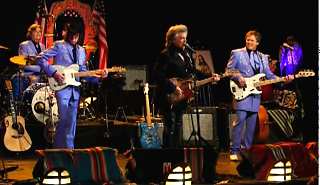
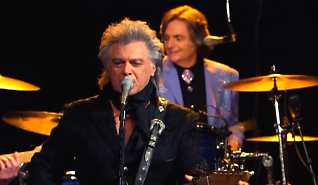
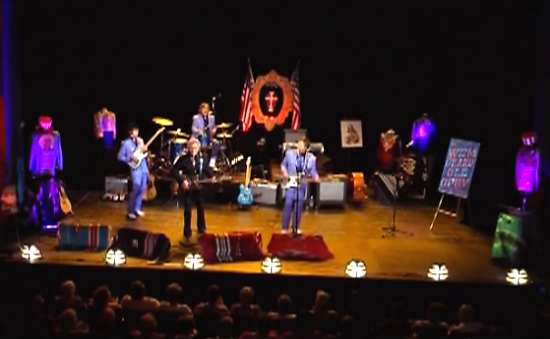
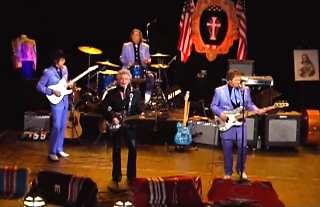
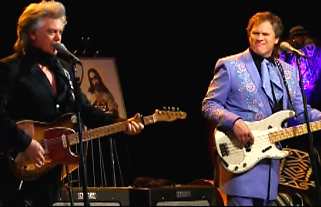
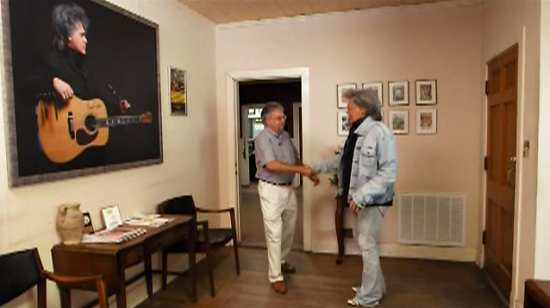
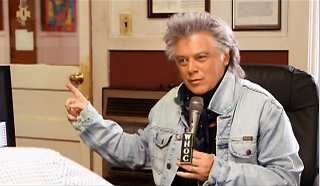
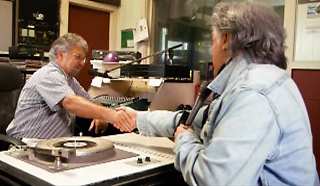
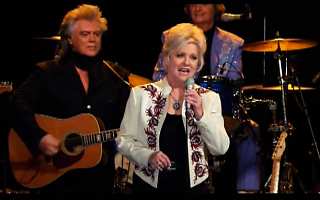
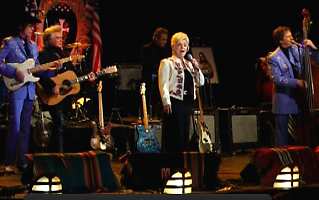
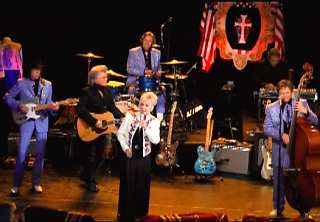
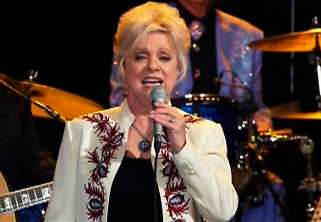
 After a commercial break,
more wonderful Philadelphia residents gave their
welcomes. Marty and The Fabulous Superlatives took
their bus and instruments to Philadelphia Gun and Pawn
Shop. There they talked with Jackie Conn, owner. and
Larry Freeny. Marty holds up his mandolin and says,
"Loaded with history. loaded with history. We hit a
little snag on the edge of town at the casino. You
know." Jackie said, "It can happen. It can happen."
Handsome Harry said, "Well it did." Marty laughed.
Jackie said, "Well, that's what we're here for." Marty
said, "Mandolin, bass fiddle, drum, and Martin guitar
from a world-class hillbilly band. What can you do?"
Jackie said, "Well, first I need to see what they'll
do." Marty said, "All right." Jackie said, "Give 'em a
test drive." Marty said, "Will it help?" Jackie said,
"It will help." Marty continued, "Well, all right. How
'bout 'The Mississippi Railroad Blues'." Jackie said,
"Sounds good." During the song, Marty told Kenny,
"Make it sound more expensive."
After a commercial break,
more wonderful Philadelphia residents gave their
welcomes. Marty and The Fabulous Superlatives took
their bus and instruments to Philadelphia Gun and Pawn
Shop. There they talked with Jackie Conn, owner. and
Larry Freeny. Marty holds up his mandolin and says,
"Loaded with history. loaded with history. We hit a
little snag on the edge of town at the casino. You
know." Jackie said, "It can happen. It can happen."
Handsome Harry said, "Well it did." Marty laughed.
Jackie said, "Well, that's what we're here for." Marty
said, "Mandolin, bass fiddle, drum, and Martin guitar
from a world-class hillbilly band. What can you do?"
Jackie said, "Well, first I need to see what they'll
do." Marty said, "All right." Jackie said, "Give 'em a
test drive." Marty said, "Will it help?" Jackie said,
"It will help." Marty continued, "Well, all right. How
'bout 'The Mississippi Railroad Blues'." Jackie said,
"Sounds good." During the song, Marty told Kenny,
"Make it sound more expensive." 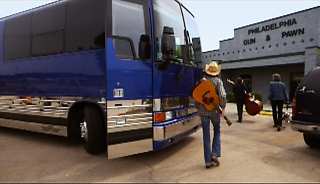
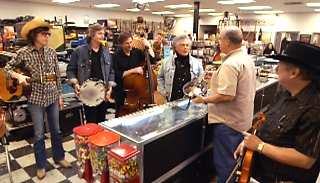
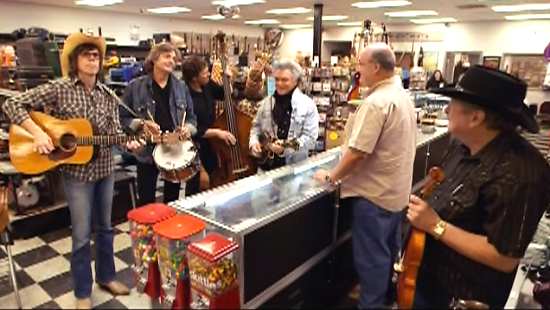
 After the song, Jackie
said, "See, just name your price." Marty then talked
about "Philadelphia always being a country music
friendly town. The Neshoba County Fair has always had
country music entertainment and still does. The
Choctaw Indian Fair has always booked country music
stars. One particular show that came through this town
that changed my life was in July of 1970. The Connie
Smith Show." Marty and Connie joined Chief Phyliss
Anderson at the football field at Choctaw Central
where the concert in 1970 was held. Marty and Connie
walked to the spot where the stage was. Marty said,
"Well, baby, I probably remember this a lot better
than you do. The details of the night. But your stage
was right here." Connie said, "I remember that." Marty
said, "We were sittin' right over there. Me and my mom
and my sister. And you sang your songs. And what I
didn't know that night was Les Leverett was here. The
great photographer from Nashville. After it was over
with, me and my sister Jennifer got our picture made
with ya right there. You remember comin' here playin?"
Connie said, "I do. The thing I remember about meetin'
you is Weldon Myrick was on the show, Jerry Shook and
Johnny Gimble. Several people were playin'." Marty
said, "Nashville session musicians." Connie said,
"Nashville session musicians. And the part I remember
is this little gorgeous little kid hopped up the
stage. Was over there talkin' to Weldon. I don't know
if you remember but you were askin' him what gauge
strings he used and all kinds of questions. And I
thought, here's this kid he has not a bashful bone in
his body and yet he's talkin' to Weldon like a
grownup. And I was impressed." Marty said, "I was
workin' my way to you through the pickers." Connie
laughed and said, "That's one of the main things I
remember." Marty said, "After it was over, I wanted
one more look atcha. So we were leavin' that gate and
I asked my mama, 'mama, let me borrow your camera'.
And you were sittin' in your station wagon right
there." Connie said, "That's right." Marty continued,
"And I went and said, 'Miss Smith, can I take your
picture' and you were just sittin' there and I took
your picture. And that's the first picture I ever made
in my life." Connie said, "I'm honored." Marty said,
"Yeah. That'll teach ya to come to Philadelphia,
Mississippi." Connie said, "That's right." Marty
continued, "But on the way home that night, I said,
'mama, I'm gonna marry her some day'. Thank you very
much for marryin' me. Here's what I wanted to do that
night."
After the song, Jackie
said, "See, just name your price." Marty then talked
about "Philadelphia always being a country music
friendly town. The Neshoba County Fair has always had
country music entertainment and still does. The
Choctaw Indian Fair has always booked country music
stars. One particular show that came through this town
that changed my life was in July of 1970. The Connie
Smith Show." Marty and Connie joined Chief Phyliss
Anderson at the football field at Choctaw Central
where the concert in 1970 was held. Marty and Connie
walked to the spot where the stage was. Marty said,
"Well, baby, I probably remember this a lot better
than you do. The details of the night. But your stage
was right here." Connie said, "I remember that." Marty
said, "We were sittin' right over there. Me and my mom
and my sister. And you sang your songs. And what I
didn't know that night was Les Leverett was here. The
great photographer from Nashville. After it was over
with, me and my sister Jennifer got our picture made
with ya right there. You remember comin' here playin?"
Connie said, "I do. The thing I remember about meetin'
you is Weldon Myrick was on the show, Jerry Shook and
Johnny Gimble. Several people were playin'." Marty
said, "Nashville session musicians." Connie said,
"Nashville session musicians. And the part I remember
is this little gorgeous little kid hopped up the
stage. Was over there talkin' to Weldon. I don't know
if you remember but you were askin' him what gauge
strings he used and all kinds of questions. And I
thought, here's this kid he has not a bashful bone in
his body and yet he's talkin' to Weldon like a
grownup. And I was impressed." Marty said, "I was
workin' my way to you through the pickers." Connie
laughed and said, "That's one of the main things I
remember." Marty said, "After it was over, I wanted
one more look atcha. So we were leavin' that gate and
I asked my mama, 'mama, let me borrow your camera'.
And you were sittin' in your station wagon right
there." Connie said, "That's right." Marty continued,
"And I went and said, 'Miss Smith, can I take your
picture' and you were just sittin' there and I took
your picture. And that's the first picture I ever made
in my life." Connie said, "I'm honored." Marty said,
"Yeah. That'll teach ya to come to Philadelphia,
Mississippi." Connie said, "That's right." Marty
continued, "But on the way home that night, I said,
'mama, I'm gonna marry her some day'. Thank you very
much for marryin' me. Here's what I wanted to do that
night." 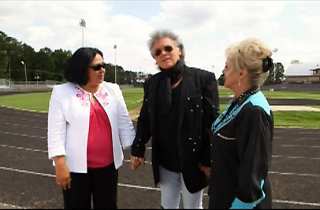
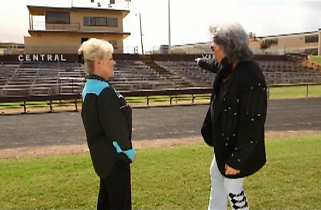
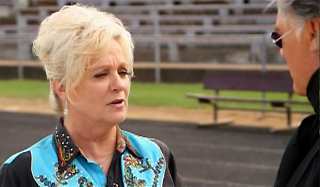
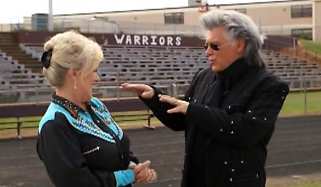
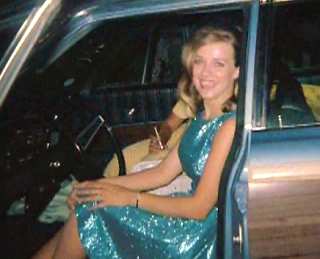
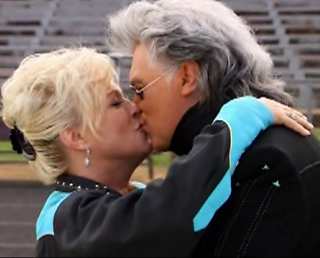
 Malcolm White, director of
tourism for the Mississippi Development Authority
talked about catching Marty's rehearsal of "I Met My
Baby At The Choctaw Fair." He said, "It pretty much
sums it up for us. He's got a Bo Diddley beat going,
with this amazing band. He's got Choctaw dancers on
stage,and he's talkin' about Connie Smith. And it sums
up his global approach and the way that he loves the
place that he came from, and the way that he takes
that with him everywhere he goes. He carries that very
positive message that many people don't know about
Mississippi. Look, it's easy for us to acknowledge
that often times people think negative things about
us. But when Marty Stuart speaks for us, he takes away
all the negatives, inserts the positives, and puts it
to a Bo Diddley beat, and everybody has a great time."
Malcolm White, director of
tourism for the Mississippi Development Authority
talked about catching Marty's rehearsal of "I Met My
Baby At The Choctaw Fair." He said, "It pretty much
sums it up for us. He's got a Bo Diddley beat going,
with this amazing band. He's got Choctaw dancers on
stage,and he's talkin' about Connie Smith. And it sums
up his global approach and the way that he loves the
place that he came from, and the way that he takes
that with him everywhere he goes. He carries that very
positive message that many people don't know about
Mississippi. Look, it's easy for us to acknowledge
that often times people think negative things about
us. But when Marty Stuart speaks for us, he takes away
all the negatives, inserts the positives, and puts it
to a Bo Diddley beat, and everybody has a great time."
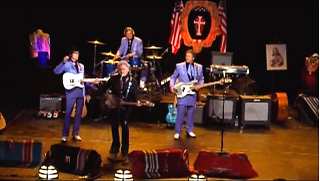
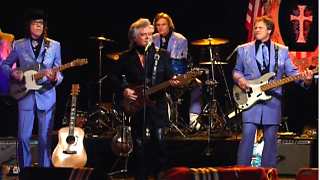

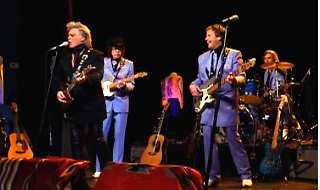
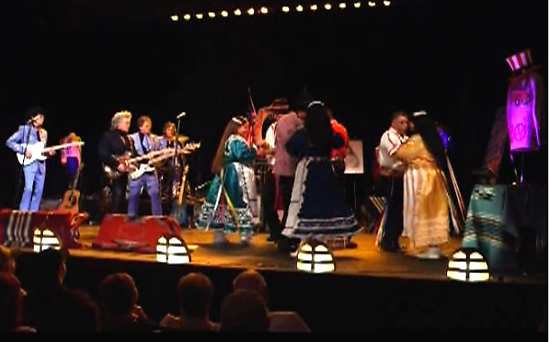
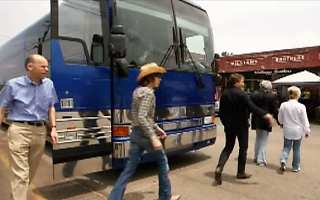
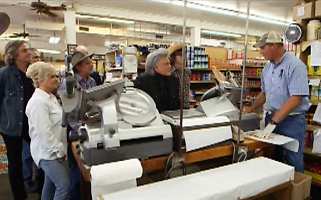
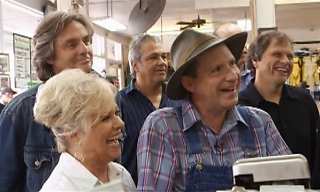
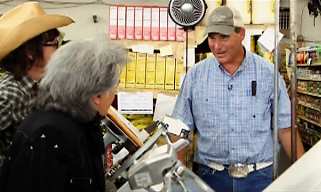
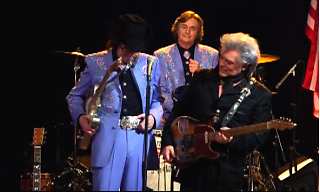
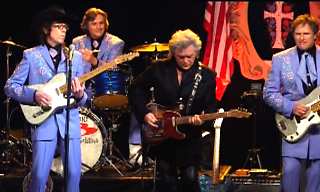
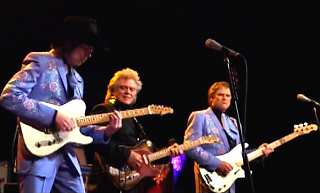
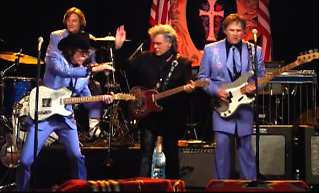
 Marty said, "I've often
said that it's the people that define a town. And some
of the finest people I know of in Philadelphia,
Mississippi and I mean that from the bottom of my
heart. It's precious people here. One lady in
particular comes to mind. Just right across the
street, down the street, I guess, from the Ellis
Theatre here, there's a place called 'Peggy's'. We all
know and love Peggy Webb. She's a Philadelphia legend.
She's a Mississippi institution. What a lot of people
don't know about Peggy is that she and her husband Don
started their restaurant in 1961. That's how she fed
her family. But everybody knows about her service in
this community. It was community tables. She put it on
the honor system. We all pay at the basket. Make our
own change. That's what Peggy thought of human beings.
She trusted us. But it was the people that couldn't
eat, couldn't afford to eat. That's the ones Peggy fed
too. And after work, leftovers were left on the table
for the kids to come by. Ladies and gentlemen, we'd
like for you to meet our loved Peggy Webb. Whataya
think." Peggy walked out on stage to a standing
ovation. Marty gave her a big hug and handed her a
bouquet of red roses. Marty said, "Peggy, on behalf of
everybody in this place, we love you with all of our
hearts." Peggy said, "I love you back." Marty said,
"We're gonna sing you a song or two. If you can just
stand there for a second, I'll talk to you in a
minute." Marty and His Fabulous Superlatives sang "All
For The Love Of A Girl."
Marty said, "I've often
said that it's the people that define a town. And some
of the finest people I know of in Philadelphia,
Mississippi and I mean that from the bottom of my
heart. It's precious people here. One lady in
particular comes to mind. Just right across the
street, down the street, I guess, from the Ellis
Theatre here, there's a place called 'Peggy's'. We all
know and love Peggy Webb. She's a Philadelphia legend.
She's a Mississippi institution. What a lot of people
don't know about Peggy is that she and her husband Don
started their restaurant in 1961. That's how she fed
her family. But everybody knows about her service in
this community. It was community tables. She put it on
the honor system. We all pay at the basket. Make our
own change. That's what Peggy thought of human beings.
She trusted us. But it was the people that couldn't
eat, couldn't afford to eat. That's the ones Peggy fed
too. And after work, leftovers were left on the table
for the kids to come by. Ladies and gentlemen, we'd
like for you to meet our loved Peggy Webb. Whataya
think." Peggy walked out on stage to a standing
ovation. Marty gave her a big hug and handed her a
bouquet of red roses. Marty said, "Peggy, on behalf of
everybody in this place, we love you with all of our
hearts." Peggy said, "I love you back." Marty said,
"We're gonna sing you a song or two. If you can just
stand there for a second, I'll talk to you in a
minute." Marty and His Fabulous Superlatives sang "All
For The Love Of A Girl." 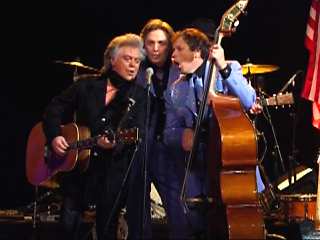
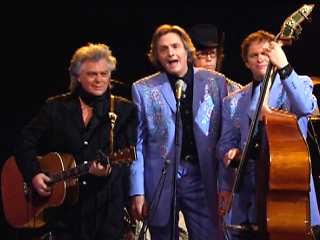
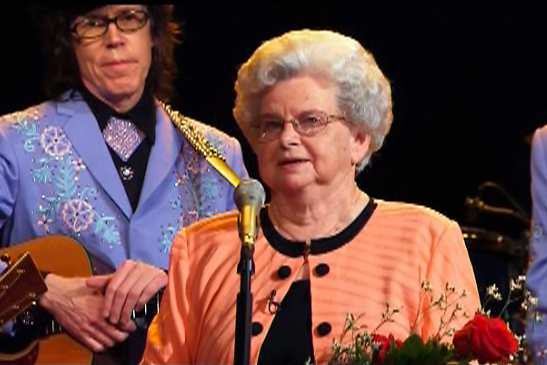
 Marty said, "Thank you. I
love you. I love you. If you'll have a seat over
there, I've got a fabulous artist for you. Ladies and
gentlemen, the ole Tennessee Slicker, the most popular
man in country music, the Sultan of Goodlettsville.
How 'bout a hand for Leroy Troy. Hello Leroy. Welcome
to Philadelphia." Leroy said, "Hey. I am so glad to be
here. I've had the biggest times since I've been
here." Marty said, "Have you?" Leroy said, "I got to
see the whole town. I got to see Miss Peggy's place."
Marty said, "Well you know by now that Wednesday is
Chicken Day at Peggy's don'tcha?" Leroy said, "Is it
Wednesday or is it Tuesday and Friday?" Marty turned
to Peggy and said, "What is it?" Peggy said, "Tuesday,
Wednesday and Friday." Marty said, "Oh, I stand
corrected." Leroy said, "We were both right." Marty
said, "That's right. Well, do you have anything that
would speak to the occasion?" Leroy said, "Shoot yeah.
I'm gonna dedicate this one to Miss Peggy." Marty
said, "All right." Leroy said, "And also, to all them
chickens that have passed over her dinner tables."
Leroy sang "Ghost Chickens In The Sky."
Marty said, "Thank you. I
love you. I love you. If you'll have a seat over
there, I've got a fabulous artist for you. Ladies and
gentlemen, the ole Tennessee Slicker, the most popular
man in country music, the Sultan of Goodlettsville.
How 'bout a hand for Leroy Troy. Hello Leroy. Welcome
to Philadelphia." Leroy said, "Hey. I am so glad to be
here. I've had the biggest times since I've been
here." Marty said, "Have you?" Leroy said, "I got to
see the whole town. I got to see Miss Peggy's place."
Marty said, "Well you know by now that Wednesday is
Chicken Day at Peggy's don'tcha?" Leroy said, "Is it
Wednesday or is it Tuesday and Friday?" Marty turned
to Peggy and said, "What is it?" Peggy said, "Tuesday,
Wednesday and Friday." Marty said, "Oh, I stand
corrected." Leroy said, "We were both right." Marty
said, "That's right. Well, do you have anything that
would speak to the occasion?" Leroy said, "Shoot yeah.
I'm gonna dedicate this one to Miss Peggy." Marty
said, "All right." Leroy said, "And also, to all them
chickens that have passed over her dinner tables."
Leroy sang "Ghost Chickens In The Sky." 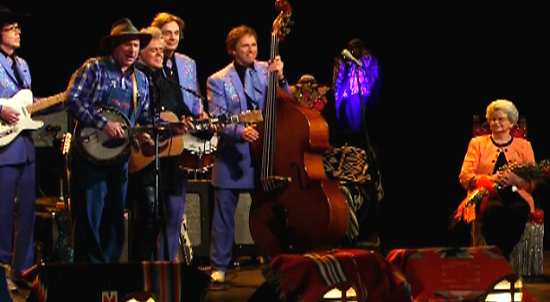
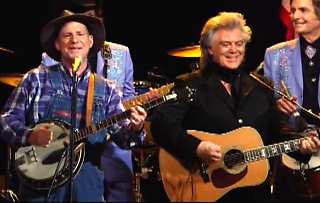
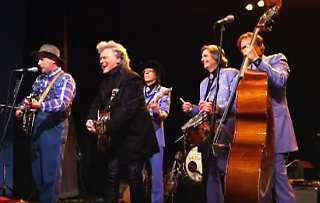
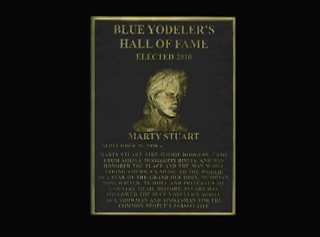
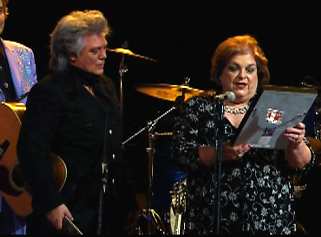
 We received more warm
welcomes from the residents of Philadelphia. Paul
Martin talked about Marty and how much the city of
Philadelphia loves Marty. Harry Stinson talked about
the genres of music and artists and other famous
people from Mississippi. Kenny Vaughan talked about
his musical heroes who are from Mississippi whom he
didn't know were from the Magnolia state. Connie said,
"When you come to Mississippi, you fall in love with
the people and then you fall in love with the culture
and the music that's there." They all talked about
Marty's influence on them.
We received more warm
welcomes from the residents of Philadelphia. Paul
Martin talked about Marty and how much the city of
Philadelphia loves Marty. Harry Stinson talked about
the genres of music and artists and other famous
people from Mississippi. Kenny Vaughan talked about
his musical heroes who are from Mississippi whom he
didn't know were from the Magnolia state. Connie said,
"When you come to Mississippi, you fall in love with
the people and then you fall in love with the culture
and the music that's there." They all talked about
Marty's influence on them. 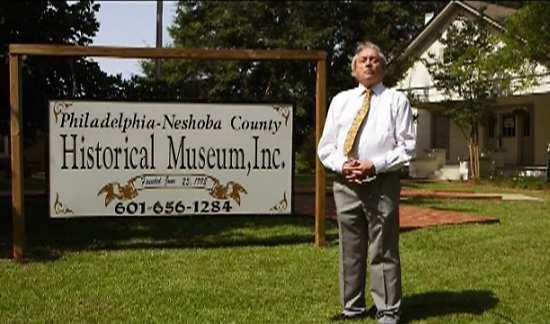
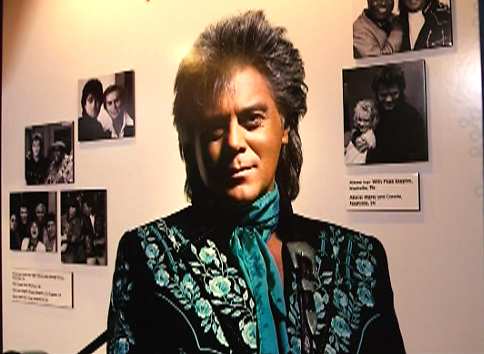
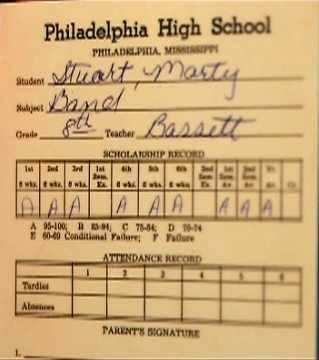
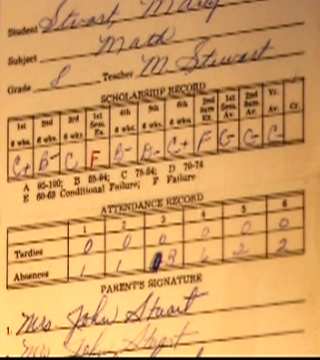
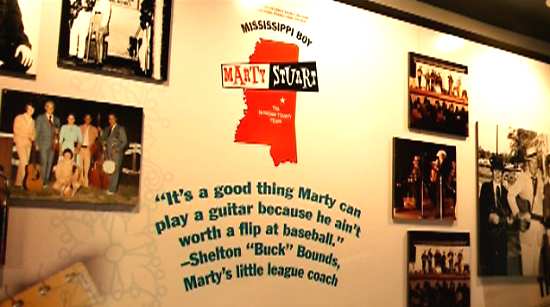
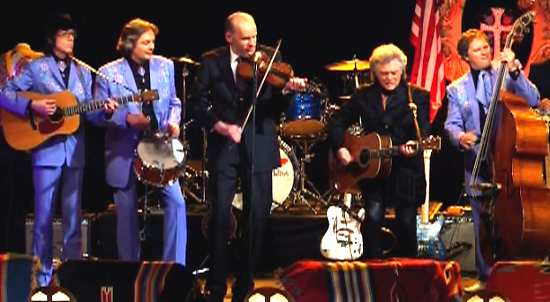
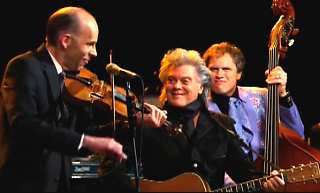
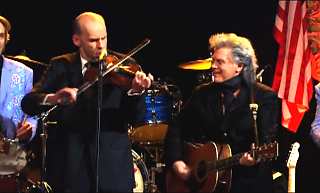
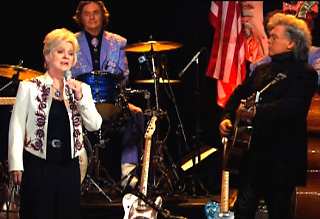
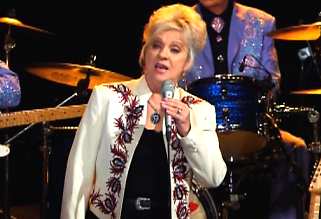
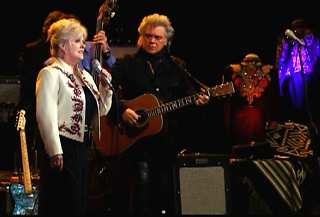
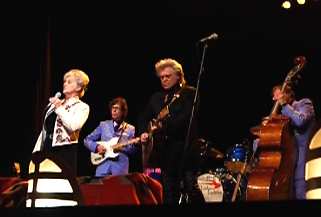
 After a commercial break,
Marty and Leroy were in Marty's Cadillac driving past
Marty's parents first house up to Marty's grandparents
homestead where friends and relatives were gathered to
welcome them. Marty said, "This house behind me
belonged to my grandpa Levi Lincoln Stuart and my
grandma Eddie Lee Stuart. They raised their sons and
daughters here. My daddy was born here on this place.
And it's the family homeplace. And my grandpa was a
wonderful character. And he was an old-time
Mississippi fiddle player. One of my original pickin'
buddies. Loved playin' music with him. But this porch
back here represents so much to me because when I was
a little boy, havin' my big dreams about singin' and
playin' music, I'd stand on this front porch with my
guitar and play to the birds and the pine trees and
the clouds. And that porch could be the Grand Ole Opry
or Carnegie Hall or Folsom Prison, wherever I wanted
it to be. It was a wonderful place. And my dreams came
to me somewhere between this old porch right here and
that railroad track that ran behind our house. What a
great place." Leroy and Marty then amused the crowd by
performing "The Death of John Henry."
After a commercial break,
Marty and Leroy were in Marty's Cadillac driving past
Marty's parents first house up to Marty's grandparents
homestead where friends and relatives were gathered to
welcome them. Marty said, "This house behind me
belonged to my grandpa Levi Lincoln Stuart and my
grandma Eddie Lee Stuart. They raised their sons and
daughters here. My daddy was born here on this place.
And it's the family homeplace. And my grandpa was a
wonderful character. And he was an old-time
Mississippi fiddle player. One of my original pickin'
buddies. Loved playin' music with him. But this porch
back here represents so much to me because when I was
a little boy, havin' my big dreams about singin' and
playin' music, I'd stand on this front porch with my
guitar and play to the birds and the pine trees and
the clouds. And that porch could be the Grand Ole Opry
or Carnegie Hall or Folsom Prison, wherever I wanted
it to be. It was a wonderful place. And my dreams came
to me somewhere between this old porch right here and
that railroad track that ran behind our house. What a
great place." Leroy and Marty then amused the crowd by
performing "The Death of John Henry."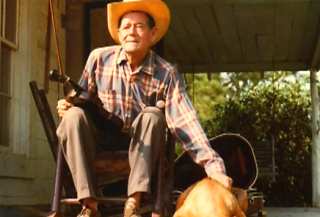
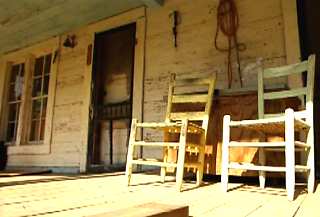
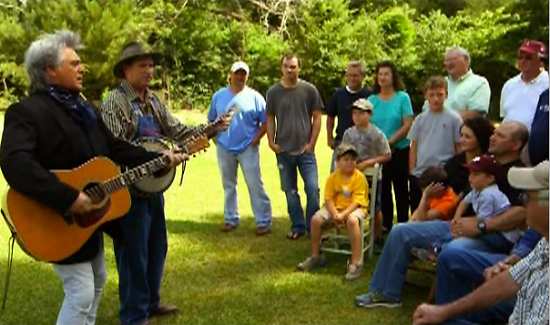
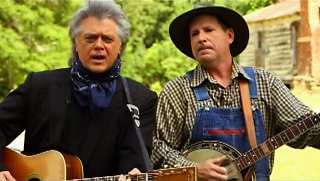
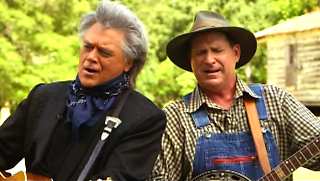
 Marty introduced his
lifetime best friend Butch Hodgins. Marty said, "Butch
and I were raised two doors apart on Kosciusko Road
and behind our houses ran the train track. The Gulf,
Mobile and Ohio Railroad, right Butch? And they used
to stop the train on this side of the tracks and take
the front half of the train to U.S. Motors where my
daddy worked and pick up a load of steel, come hook
back up and take off and go to north Mississippi with
it. And there was a fella when they'd stop the train
... me and Butch would go down and visit with that
worked in the caboose and he gave us stationery,
pencils, flares. I still don't know who set them woods
on fire, do you? One day Butch was off doin' somethin'
and the train was stopped and I went down there and
there was this fella standin' there smokin' a
cigarette by the stopped train. And his hair was kinda
crazy. And he was wearin' a scarf. And he was wearin'
clothes that looked like they were from another time.
Kinda ruined finery. And he told me great stories
about travelin' to beautiful, far away, exotic lands
-- like Alabama and Arkansas. He fascinated me. He
captivated me with his stories. And when the train
started to take off, he thumped his cigarette and he
jumped up on her and I said, 'Scuse me sir. Can you
tell me what you are?'. He said, 'Boy, I'm a hobo.'
And I had a revelation. I said 'That's what I'm gonna
do with my life'. And I went home and I said, 'Mama, I
found it. I know what I'm gonna do.' So ladies and
gentlemen, I say to you, here I stand, with a scarf,
clothes from another time, I've been to Alabama and
Arkansas. I am the personification of the American
dream. I am a hobo. Thank you very much. From the
record The Pilgrim, here's a song I
wrote called 'Hobo's Prayer'."
Marty introduced his
lifetime best friend Butch Hodgins. Marty said, "Butch
and I were raised two doors apart on Kosciusko Road
and behind our houses ran the train track. The Gulf,
Mobile and Ohio Railroad, right Butch? And they used
to stop the train on this side of the tracks and take
the front half of the train to U.S. Motors where my
daddy worked and pick up a load of steel, come hook
back up and take off and go to north Mississippi with
it. And there was a fella when they'd stop the train
... me and Butch would go down and visit with that
worked in the caboose and he gave us stationery,
pencils, flares. I still don't know who set them woods
on fire, do you? One day Butch was off doin' somethin'
and the train was stopped and I went down there and
there was this fella standin' there smokin' a
cigarette by the stopped train. And his hair was kinda
crazy. And he was wearin' a scarf. And he was wearin'
clothes that looked like they were from another time.
Kinda ruined finery. And he told me great stories
about travelin' to beautiful, far away, exotic lands
-- like Alabama and Arkansas. He fascinated me. He
captivated me with his stories. And when the train
started to take off, he thumped his cigarette and he
jumped up on her and I said, 'Scuse me sir. Can you
tell me what you are?'. He said, 'Boy, I'm a hobo.'
And I had a revelation. I said 'That's what I'm gonna
do with my life'. And I went home and I said, 'Mama, I
found it. I know what I'm gonna do.' So ladies and
gentlemen, I say to you, here I stand, with a scarf,
clothes from another time, I've been to Alabama and
Arkansas. I am the personification of the American
dream. I am a hobo. Thank you very much. From the
record The Pilgrim, here's a song I
wrote called 'Hobo's Prayer'." 